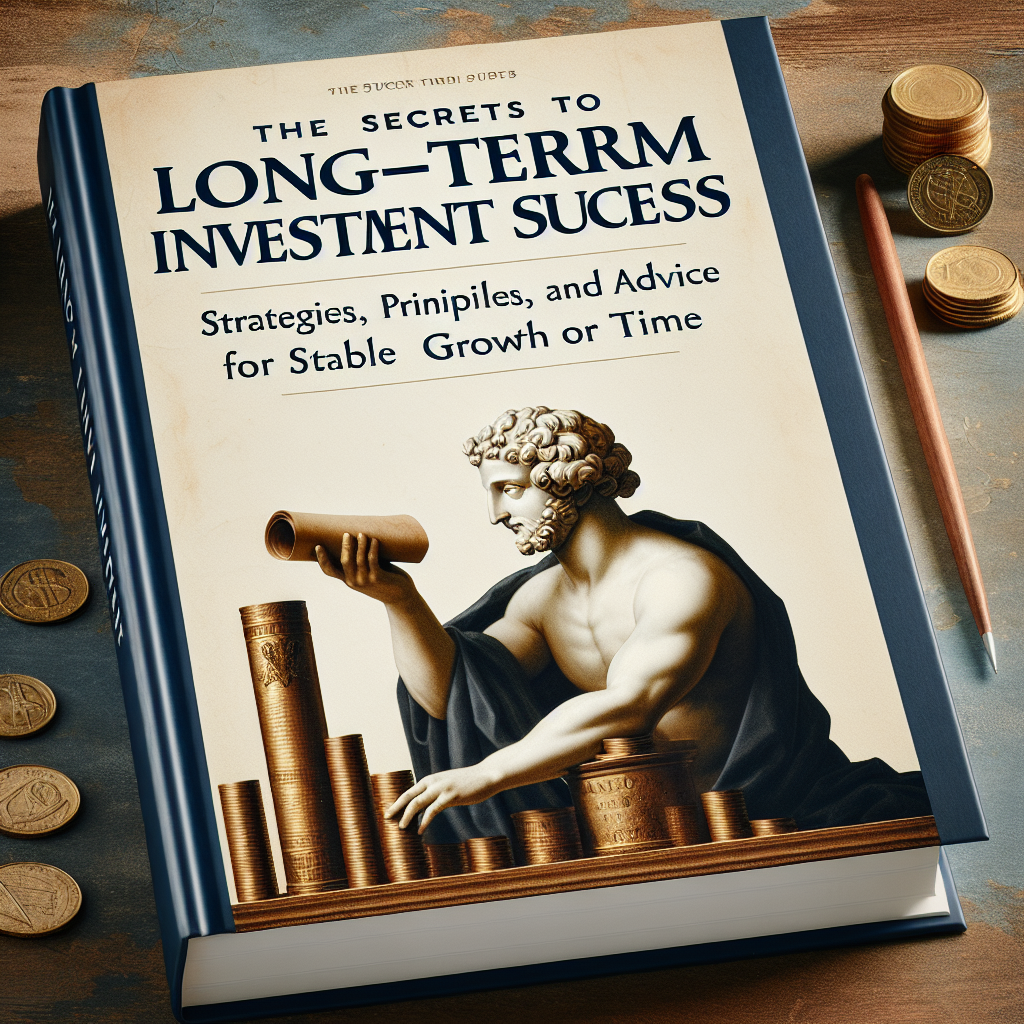Warren Buffetts toppstrategier för värdeinvesteringar
The Power of Patience: How Warren Buffett’s Long-Term Approach to Investing Pays Off
Warren Buffett, also known as the Oracle of Omaha, is one of the most successful investors in the world. With a net worth of over $100 billion, he has proven time and time again that his strategies for value investing are effective and profitable. But what sets Buffett apart from other investors? The answer lies in his approach to investing – one that is rooted in patience and a long-term perspective.
Buffett’s investment philosophy is centered around the concept of value investing, which involves buying stocks that are undervalued by the market. This means that he looks for companies that have strong fundamentals, such as a solid balance sheet, a competitive advantage, and a proven track record of profitability. He then purchases these stocks at a discounted price, with the belief that their true value will eventually be recognized by the market.
One of the key principles of Buffett’s investment strategy is patience. He famously said, ”The stock market is a device for transferring money from the impatient to the patient.” This means that he is willing to wait for the right opportunity to come along, rather than jumping into every stock that catches his eye. This patience allows him to thoroughly research and analyze a company before making an investment decision.
Another aspect of Buffett’s approach to investing is his long-term perspective. He is not interested in short-term gains or quick profits. Instead, he focuses on the long-term potential of a company and its ability to generate consistent returns over time. This is why he often holds onto his investments for years, even decades, allowing them to grow and compound in value.
One of the most famous examples of Buffett’s patience and long-term perspective is his investment in Coca-Cola. In 1988, he purchased $1 billion worth of Coca-Cola stock, which at the time was a significant portion of his portfolio. Many investors were skeptical of this move, as the company was facing challenges and its stock price was declining. However, Buffett saw the long-term potential of the brand and its strong fundamentals. He held onto the stock for over 30 years, and today, that $1 billion investment is worth over $20 billion.
Buffett’s approach to investing also involves avoiding the temptation of market timing. He does not try to predict when the market will go up or down, but instead focuses on the fundamentals of the companies he invests in. This allows him to stay calm and rational during market fluctuations, which are inevitable in the world of investing. As he famously said, ”Be fearful when others are greedy and greedy when others are fearful.”
In addition to patience and a long-term perspective, Buffett also emphasizes the importance of diversification. He believes in not putting all of your eggs in one basket and spreading out your investments across different industries and companies. This helps to minimize risk and protect against potential losses.
Another key aspect of Buffett’s investment strategy is his focus on cash flow. He looks for companies that generate strong and consistent cash flow, as this is a sign of a healthy and sustainable business. This also allows him to have a steady stream of income from his investments, which he can then use to make further investments.
In conclusion, Warren Buffett’s success as an investor can be attributed to his patience, long-term perspective, and focus on value investing. He has proven that by staying disciplined and sticking to his principles, it is possible to achieve significant returns in the stock market. As he famously said, ”The stock market is a no-called-strike game. You don’t have to swing at everything – you can wait for your pitch.” So, take a page out of Buffett’s book and remember the power of patience in your own investment journey.
Sticking to the Basics: The Simple yet Effective Principles of Buffett’s Value Investing Strategy
Warren Buffett, also known as the Oracle of Omaha, is one of the most successful investors in the world. With a net worth of over $100 billion, he has proven time and time again that his value investing strategy is a winning one. But what exactly is value investing and how does Buffett approach it? In this article, we will delve into the basics of Buffett’s value investing strategy and how you can apply it to your own investment portfolio.
At its core, value investing is about buying stocks that are undervalued by the market. This means that the stock price is lower than the intrinsic value of the company. In other words, the stock is on sale and you are getting a good deal. This may seem like a simple concept, but it requires a lot of research and analysis to identify these undervalued stocks.
One of the key principles of Buffett’s value investing strategy is to invest in companies with a strong and stable business model. He looks for companies that have a competitive advantage, also known as a moat, which makes it difficult for competitors to enter the market. This could be in the form of a strong brand, patents, or a unique product or service. By investing in companies with a moat, Buffett ensures that his investments are protected from market fluctuations and can generate consistent returns over time.
Another important aspect of Buffett’s value investing strategy is to focus on the long-term. He famously said, ”Our favorite holding period is forever.” This means that he does not buy and sell stocks frequently, but rather holds onto them for years, even decades. This allows him to ride out any short-term market fluctuations and benefit from the long-term growth of the company. It also reduces transaction costs and taxes, which can eat into profits.
In addition to looking for undervalued stocks with a strong business model, Buffett also pays close attention to the management of the company. He believes that a company’s management team plays a crucial role in its success. He looks for companies with honest and competent management who have a track record of making smart business decisions. This is because even the best business model can fail if it is not managed properly.
One of the most important principles of Buffett’s value investing strategy is to always do your own research. He famously said, ”Never invest in a business you cannot understand.” This means that investors should thoroughly research a company before investing in it. This includes analyzing financial statements, understanding the industry and competition, and keeping up with any news or developments related to the company. By doing your own research, you can make informed investment decisions and avoid relying on others’ opinions.
Another key aspect of Buffett’s value investing strategy is to be patient. He understands that the stock market can be unpredictable and that it takes time for a company’s value to be recognized by the market. This is why he advises investors to have a long-term mindset and not get swayed by short-term market movements. By being patient, investors can avoid making impulsive decisions and give their investments time to grow.
In conclusion, Warren Buffett’s value investing strategy is based on simple yet effective principles. By investing in undervalued companies with a strong business model, focusing on the long-term, paying attention to management, doing your own research, and being patient, investors can potentially achieve success in the stock market. However, it is important to note that value investing requires discipline, patience, and a thorough understanding of the companies you are investing in. So, take a page out of Buffett’s book and stick to the basics of value investing for a successful investment journey.
The Importance of Due Diligence: How Buffett’s Thorough Research Sets Him Apart in the Investment World
Warren Buffett, also known as the Oracle of Omaha, is one of the most successful investors in the world. With a net worth of over $100 billion, he has proven time and time again that his investment strategies are effective and profitable. One of the key factors that sets Buffett apart from other investors is his emphasis on due diligence.
Due diligence is the process of thoroughly researching and analyzing a company before making an investment decision. It involves looking at a company’s financial statements, management team, competitive landscape, and overall industry trends. This process is crucial for making informed investment decisions and avoiding costly mistakes.
Buffett’s approach to due diligence is meticulous and thorough. He believes that the more you know about a company, the better equipped you are to make a sound investment decision. This is evident in his famous quote, ”Risk comes from not knowing what you’re doing.”
One of the first steps in Buffett’s due diligence process is to understand the company’s financials. He looks at a company’s balance sheet, income statement, and cash flow statement to get a clear picture of its financial health. This helps him determine if the company has a strong financial foundation and if it is capable of generating consistent profits.
But Buffett doesn’t stop there. He also looks at a company’s management team and their track record. He believes that a company’s success is heavily influenced by the people running it. Therefore, he looks for companies with competent and trustworthy management teams who have a proven track record of success.
In addition to analyzing the company itself, Buffett also pays close attention to the competitive landscape and industry trends. He looks for companies that have a competitive advantage, whether it be through a strong brand, unique product, or cost advantage. He also looks for companies that are in industries with long-term growth potential.
Buffett’s thorough research and analysis allow him to make informed investment decisions. He doesn’t rely on speculation or market trends, but rather on solid data and facts. This approach has helped him avoid risky investments and make profitable ones.
Another important aspect of Buffett’s due diligence process is his focus on the long-term. He is known for his buy-and-hold strategy, where he invests in companies for the long haul. This means that he is not swayed by short-term market fluctuations and instead focuses on the long-term potential of a company.
This approach has proven to be successful for Buffett, as he has held onto investments in companies like Coca-Cola and American Express for decades, reaping significant returns over time. This also allows him to avoid the temptation of trying to time the market, which can be a risky and unpredictable strategy.
In addition to his thorough research and long-term focus, Buffett also emphasizes the importance of patience and discipline in the investment world. He understands that the market can be volatile and that there will be ups and downs. However, he stays true to his investment principles and doesn’t let short-term fluctuations sway his decisions.
In conclusion, Warren Buffett’s emphasis on due diligence sets him apart in the investment world. His meticulous research and analysis, focus on the long-term, and discipline have helped him become one of the most successful investors of all time. As investors, we can learn from his approach and incorporate it into our own investment strategies to increase our chances of success. Remember, as Buffett says, ”The stock market is a device for transferring money from the impatient to the patient.”
The Art of Contrarian Thinking: How Buffett Finds Value in Unpopular Stocks
Warren Buffett, also known as the Oracle of Omaha, is one of the most successful investors in the world. With a net worth of over $100 billion, he has built his fortune through his company Berkshire Hathaway and his savvy investment strategies. One of the key principles that has guided Buffett throughout his career is his approach to value investing.
Value investing is a strategy that involves buying stocks that are undervalued by the market. This means that the stock price is lower than the intrinsic value of the company, making it a bargain for investors. While this may seem like a simple concept, it requires a contrarian mindset and the ability to think independently from the crowd. This is where Buffett’s top strategies for value investing come into play.
The first strategy that Buffett employs is to focus on the long-term. He famously said, ”Our favorite holding period is forever.” This means that he looks for companies with strong fundamentals and a sustainable competitive advantage that will continue to generate profits for years to come. This goes against the common practice of buying and selling stocks quickly for short-term gains. By holding onto stocks for the long-term, Buffett is able to ride out market fluctuations and benefit from the compounding effect of his investments.
Another key strategy that Buffett uses is to invest in companies with a strong economic moat. This refers to a company’s ability to maintain a competitive advantage over its competitors. This can be achieved through various factors such as brand recognition, patents, or high barriers to entry. By investing in companies with a strong economic moat, Buffett ensures that his investments are protected from competition and can continue to generate profits.
In addition to focusing on the long-term and economic moats, Buffett also looks for companies with a strong management team. He believes that a company’s success is heavily influenced by its leadership. Buffett looks for CEOs who are honest, have a clear vision for the company, and are focused on creating long-term value for shareholders. He also values companies with a decentralized management structure, where decision-making is spread out among various individuals rather than being centralized in one person. This allows for a more diverse range of perspectives and reduces the risk of poor decision-making.
One of the most important aspects of value investing is the concept of margin of safety. This refers to the difference between the intrinsic value of a company and its stock price. Buffett always looks for a significant margin of safety when investing, as it provides a cushion against potential losses. This means that even if the stock price were to drop, the investor would still have a margin of safety to protect their investment. This is a crucial aspect of value investing, as it minimizes risk and increases the potential for long-term gains.
Lastly, Buffett’s top strategy for value investing is to be patient and disciplined. He understands that the market can be unpredictable and that it takes time for a company’s true value to be reflected in its stock price. This requires patience and discipline to stick to his investment strategy, even when others may be panicking or chasing short-term gains. Buffett famously said, ”The stock market is a device for transferring money from the impatient to the patient.” By staying disciplined and patient, Buffett has been able to capitalize on opportunities that others may have missed.
In conclusion, Warren Buffett’s top strategies for value investing revolve around a contrarian mindset, a focus on the long-term, and a disciplined approach. By investing in undervalued companies with strong fundamentals, economic moats, and a margin of safety, Buffett has been able to consistently generate long-term gains for himself and his shareholders. Aspiring investors can learn from his approach and apply these strategies to their own investment decisions. After all, as Buffett himself said, ”The best investment you can make is in yourself.”
The Role of Discipline: How Buffett’s Self-Control and Rationality Drive His Investment Success
Warren Buffett, also known as the Oracle of Omaha, is widely regarded as one of the most successful investors in the world. With a net worth of over $100 billion, Buffett has consistently outperformed the market and built a massive fortune through his investment strategies. But what sets him apart from other investors? The answer lies in his discipline and rationality.
Buffett’s investment philosophy is centered around the concept of value investing, which involves buying undervalued stocks and holding them for the long term. This approach requires a great deal of discipline and patience, which are two qualities that Buffett possesses in abundance.
One of the key factors that contribute to Buffett’s success is his self-control. He is known for his ability to resist the temptation of short-term gains and focus on the long-term prospects of a company. This self-control is evident in his famous quote, ”The stock market is a device for transferring money from the impatient to the patient.”
Buffett’s self-control is also reflected in his investment decisions. He does not let emotions or market fluctuations sway his judgment. Instead, he relies on his rationality and analytical skills to make informed investment choices. This approach has helped him avoid impulsive decisions and stay true to his investment philosophy.
Another aspect of Buffett’s discipline is his strict adherence to his investment criteria. He has a set of rules that he follows when evaluating a company, and he does not deviate from them. This discipline has helped him avoid risky investments and focus on companies with strong fundamentals and a competitive advantage.
In addition to self-control, Buffett’s rationality is a crucial factor in his investment success. He is known for his ability to cut through the noise and focus on the essential aspects of a company. This rationality allows him to see the bigger picture and make decisions based on long-term potential rather than short-term gains.
Buffett’s rationality is also evident in his approach to risk management. He understands that every investment carries a certain level of risk, and he takes calculated risks rather than blindly following market trends. This approach has helped him minimize losses and maximize returns over the years.
Moreover, Buffett’s rationality is reflected in his focus on the intrinsic value of a company. He looks beyond the stock price and evaluates a company based on its fundamentals, such as its earnings, cash flow, and management. This approach has helped him identify undervalued stocks and capitalize on them before the market catches on.
Another aspect of Buffett’s rationality is his ability to learn from his mistakes. He does not shy away from admitting when he has made a wrong investment decision and takes the necessary steps to rectify it. This humility and willingness to learn have helped him become a better investor over the years.
In conclusion, Warren Buffett’s discipline and rationality are the driving forces behind his investment success. His self-control allows him to resist short-term temptations and stay true to his long-term investment philosophy. His rationality helps him make informed decisions based on a company’s fundamentals rather than market trends. As investors, we can learn a lot from Buffett’s approach and apply it to our own investment strategies. After all, as he famously said, ”The best investment you can make is in yourself.”



















